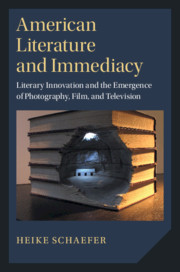 American Literature and Immediacy
American Literature and Immediacy from Part II - Literary Immediacy and the Cinema
Published online by Cambridge University Press: 19 December 2019
The chapter argues that John Dos Passos in his novel Manhattan Transferappropriates cinematic immediacy effects and documentary aesthetics for the sake of literary innovation and cultural intervention. His formal innovations—the narrative’s montage structure, shifting focalization, and sampling of mass media item—allow the novel to convey the complexity of modern city life while opening up a critical perspective on mass media discourse and urban consumer culture. The chief strategy Dos Passos uses to critically refract popular mass culture is the creation and subsequent dissolution of immediacy effects that encourage the readers to grapple self-reflexively with the text, their reading strategies, and the represented social realities. The novel’s documentary style creates an urban world that seems recorded rather than imagined. Yet the novel continually disrupts this impression of immediacy: its disjunctive structure and surprising narrative shifts confront the readers with their interpretive routines and push them to develop new ways of reading that enable them to cope with both the novel’s experimental form and the depicted cultural practices.
To save this book to your Kindle, first ensure no-reply@cambridge.org is added to your Approved Personal Document E-mail List under your Personal Document Settings on the Manage Your Content and Devices page of your Amazon account. Then enter the ‘name’ part of your Kindle email address below. Find out more about saving to your Kindle.
Note you can select to save to either the @free.kindle.com or @kindle.com variations. ‘@free.kindle.com’ emails are free but can only be saved to your device when it is connected to wi-fi. ‘@kindle.com’ emails can be delivered even when you are not connected to wi-fi, but note that service fees apply.
Find out more about the Kindle Personal Document Service.
To save content items to your account, please confirm that you agree to abide by our usage policies. If this is the first time you use this feature, you will be asked to authorise Cambridge Core to connect with your account. Find out more about saving content to Dropbox.
To save content items to your account, please confirm that you agree to abide by our usage policies. If this is the first time you use this feature, you will be asked to authorise Cambridge Core to connect with your account. Find out more about saving content to Google Drive.